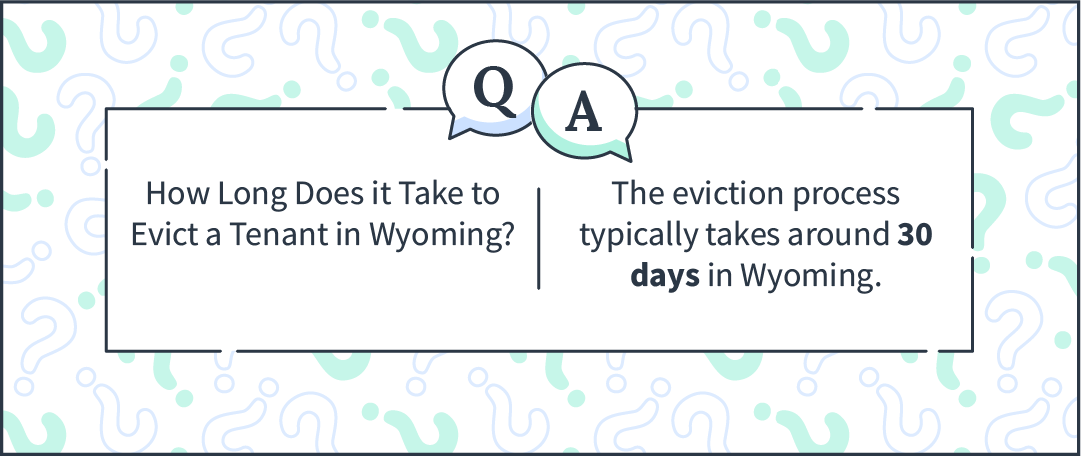
With seven national parks, a low cost of living, and a booming job economy, Wyoming is a great option for people looking to relocate. Home values are currently on the upswing, and median rent prices are above average here. With low property tax and crime rates, Wyoming is a great place to invest in rental property.
Laws that impact the rental market, landlords, and tenants are constantly being decided in states. Make sure you know what’s on your ballot – find Wyoming voting information.
Marketing. Applications. Leases. Payments.
Wyoming Tenants’ Rights and Landlord Responsibilities
- Must return security deposit within 30 days
- Landlords may charge whatever they deem reasonable for rent
- No notice required to enter property
- No time requirement for repairs
When it comes to Wyoming rental laws, there are a few specifics landlords need to know:
- Security Deposit – There is no limit to what a landlord may charge for a security deposit. The landlord must return the deposit to the tenant within 30 days of lease termination or 15 days of receiving a forwarding address.
- Rent – Wyoming has no legal maximum for what a landlord may charge for rent. There is also no limit on the amount a landlord may raise the rent, and they are not required to give any notice. Wyoming does not limit how much a landlord may charge for a late fee.
- Repairs – Tenants cannot withhold rent if a landlord fails to make repairs unless necessary for habitability. If a tenant does withhold rent, the landlord can evict them.
- Notice for Entry – Wyoming does not require the landlord to provide notice before entering the rental property.
- Disclosures – Landlords must disclose the use of any lead-based paint on the property.
Wyoming Landlords’ Rights and Tenant Responsibilities
- Tenants are required to keep the property safe and livable
- No limit for late fees
- Abandoned property must be claimed within 7 days
- Victims of domestic violence may terminate the lease
- Tenants Responsibilities – Tenants must keep the property clean, safe, and habitable. They are also responsible for making minor repairs when needed and keeping fixtures clean.
- Late Fees – Landlords may charge whatever they deem reasonable as a late fee if a tenant fails to pay rent on time. If a check bounces, the maximum penalty a landlord may charge is $30.
- Abandoned Property – If a tenant moves out and leaves behind personal belongings, the landlord must send them a written notice and seven days to claim the property. If the tenant does not pick up the items, the landlord may dispose of the property however they deem fit.
- Special Protections – If a tenant is a victim of domestic violence, they may terminate the lease agreement as long as they give the landlord a seven-day notice.
Rental Application Fees
There are no additional fees specified in this section.
Criminal Background Check
- HUD (Federal) laws do not classify criminal backgrounds as a protected class, but making a decision to rent based off a criminal background alone could lead to a discrimination charge as it impacts certain protected groups of people disproportionately.
- However, if the criminal background check revealed a crime for the manufacture and distribution of drugs, homicide and/or stalking, denying the application is allowed.
- Landlords should have a consistent and equal policy or procedure in place to follow regarding criminal background checks so as not to discriminate against one class of people over another.
- HUD states that a landlord cannot ask about arrest records, only convictions, as innocent people are commonly arrested though the situation may not have resulted in a conviction.
- Some municipalities may have written their own laws expanding onto what you can and cannot ask regarding criminal backgrounds during the tenant screening process.
Disclosures
Landlords who impose a nonrefundable fee must state that it is nonrefundable in the lease agreement.
Wyoming Lease Agreement Example
There are three sections to a residential lease agreement. The first section outlines the custom details of the contract, such as who’s involved and for what address. Here’s an example Wyoming lease agreement listing details found in Section 1:
| Property Address: | 1200 Broadway Ave. Unit #104, Laramie, WY 82071 | |
| Lease Start Date: | 3/01/21 | See section 1.5 |
| Lease End Date: | 2/28/22 | See section 1.5 |
| Total Monthly Rent: | $1,620.00 | See section 1.6 |
| Monthly Base Rent: | $1,500.00 | See section 1.6 |
| Monthly Pet Rent: | $120.00 | See section 1.6 |
| Prorated Rent Amount: | $1,000.00 | See section 1.10 |
| Total Deposit(s): | $1,500 | See section 1.8 |
| Security Deposit: | N/A | See section 1.8 |
| Pet Deposit: | N/A | See section 1.8 |
| Other Deposit: | N/A | See section 1.8 |
| Total Non Refundable Fee(s): | $100.00 | See section 1.9 |
| Move-in Fee: Description | $100.00 | See section 1.9 |
| Late Fee: | 5% if not paid by the 5th. | See section 2.1 |
Wyoming Landlord-Tenant Law FAQ
Below are brief answers for some of the most commonly-asked questions when it comes to landlord-tenant law in Wyoming.
Can You Withhold Rent in Wyoming?
Tenants can only withhold rent in Wyoming if the landlord fails to make repairs necessary for livability within the property.
How Long Does it Take to Evict a Tenant in Wyoming?
The eviction process typically takes around 30 days in Wyoming.
Is Wyoming a Landlord-Friendly State?
Yes. With no limits on rent, a quick eviction process, the ability to enter the unit at any time, and no time requirement to make repairs, Wyoming is one of the more landlord-friendly states.
What is the Eviction Process in Wyoming?
You can evict a tenant for two reasons in Wyoming, violating the lease agreement or not paying rent. The first step taken in the eviction process is to supply the tenant with notice. The tenant then has three days to cure their violation, and if they fail to do so, then the landlord may file for eviction. The tenant must then be served within three to 12 days. There is no requirement for how soon a court hearing must be held after the eviction is served. If the judge rules in favor of the eviction, then a writ of restitution will be issued within a few hours to a few days. Once the tenant receives this, they must move out within two days.
Can Landlords Require Renters Insurance in Wyoming?
The state of Wyoming does not require renters insurance, however, individual landlords may.
Wyoming Landlord-Tenant Law Resources
Wyoming Fair Housing Resources
Wyoming State Resources
Wyoming Real Estate Associations
City-Specific Housing Resources
Laramie




